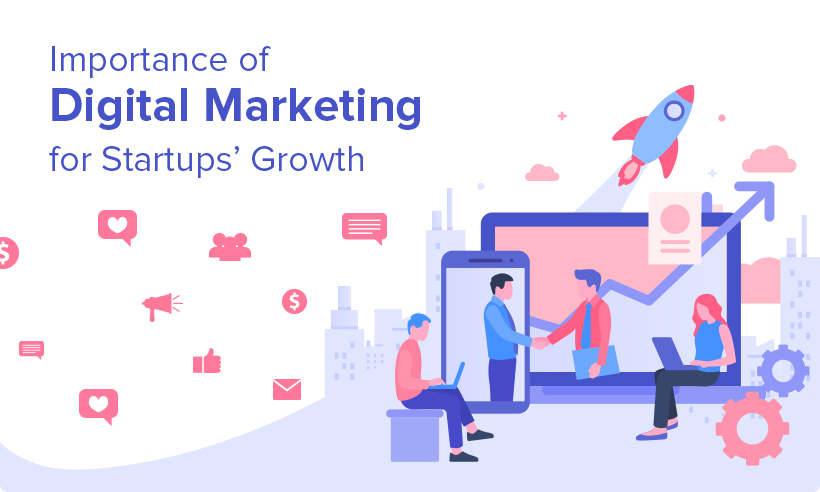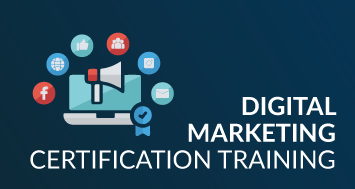Launching a new business is an exciting yet challenging undertaking. With limited resources and brand recognition, startups need creative, cost-effective strategies to attract customers and stand out from the competition. This is where digital marketing becomes critical.
Digital marketing refers to promoting products or services using digital technologies and media, including the internet, mobile apps, social media, email, and more. For fledgling startups, focusing on digital marketing from day one provides unparalleled opportunities for growth by allowing them to:
- Quickly build brand awareness and establish an online presence
- Reach and acquire potential customers in a targeted, measurable way
- Interact with and convert leads into paying customers
- Gather data and optimize campaigns based on insights
- Compete with bigger brands on an equal playing field
- Pivot and adapt marketing strategies as needed
- Accomplish key goals with limited resources
In today’s digital age, consumers are online and on social media constantly. By utilizing digital marketing platforms and techniques, startups can gain visibility and scale rapidly to attract their ideal audience. The following sections will explore the critical reasons digital marketing is essential for any startup business looking to grow in a competitive landscape.
Build Brand Awareness
Digital marketing is an invaluable tool for startups looking to build brand awareness and establish credibility. With limited budgets, startups can leverage digital tactics to reach and engage their target audience in a cost-effective manner.
Social media platforms like Facebook, Instagram, and LinkedIn provide startups with direct access to current and potential customers. By consistently posting engaging content like images, videos, and blogs, startups can organically build an audience and increase visibility. Strategic use of hashtags and tagging relevant accounts helps expand reach. Paid social ads allow further targeting and amplification.
Search engine optimization (SEO) makes it possible for startups to appear on the first page of search engines for relevant queries. By optimizing website content, page titles, meta descriptions, etc. startups can achieve high organic rankings and visibility without paying for ads. Guest posting on authority websites also helps build credibility and backlinks.
Content marketing involves creating high-quality, valuable content like blogs, guides, videos, podcasts, and infographics that attract and engage potential customers. This strategy increases domain authority and positions startups as industry thought leaders. Email newsletters, lead magnets, and calls-to-action help convert readers into customers.
The wide reach, inbound nature, and cost efficiency of digital marketing make it the ideal channel for startups to build brand awareness and trust in the early stages. Done right, it establishes credibility and generates results on a limited budget.
Acquire Customers Cost-Effectively
Digital marketing provides startups a cost-effective way to acquire new customers at scale compared to traditional marketing. With a limited budget, startups need to make every dollar count when it comes to customer acquisition.
Traditional marketing like TV, radio, and print ads can be incredibly expensive to run continuously. Digital marketing channels like social media, SEO, and pay-per-click (PPC) ads have much lower costs per lead or customer acquired. Startups can test many different digital campaigns and only scale the ones that prove to have a positive ROI.
With digital marketing, you only pay when someone engages with your ads or content. With SEO, you invest in creating valuable content that ranks high in search engines, paying nothing directly to acquire visitors. Social media platforms allow highly targeted advertising at very low cost per click or impression. PPC ads through Google or Facebook allow setting daily budgets and getting charged only when users click your ad.
The metrics and analytics available in digital marketing also allow startups to monitor their ROI closely. You can attribute sales or leads back to specific campaigns and kill ones not delivering. With traditional marketing, measuring direct impact on customer acquisition is more difficult.
The scalability of digital also makes it more cost-effective as startups grow. With traditional marketing, reaching more customers requires significantly higher spend. With digital, you can often reach a larger audience with minimal incremental cost. This allows startups to control their growth in a cost-efficient way.
Target Ideal Customers
One of the biggest advantages of digital marketing for startups is the ability to precisely target your ideal customers. With traditional marketing tactics like TV, radio, and print ads, it’s difficult to zero in on a specific demographic or psychographic. But with digital tactics, you can reach the exact people most likely to become customers.
Some key ways startups can target ideal customers with digital marketing include:
-
Paid search ads – Google Ads and other paid search platforms allow you to target ads using keywords, location, demographics, interests, and more. You can continuously optimize your targeting to focus your ad spend on prospects most likely to convert.
-
Social media ads – Platforms like Facebook and Instagram let you target social ads based on detailed criteria like age, gender, interests, behaviors, and intent. This makes it easy to find your ideal customers hanging out on social.
-
Content marketing – By creating content optimized for topics and keywords that resonate with your ideal customers, you can organically attract the right people through search and social sharing.
-
Email marketing – Segment your email lists by demographics, interests, and engagement to send tailored messages to prospects most likely to buy.
-
Remarketing – Remarketing or retargeting ads allow you to focus ad spend on people who have already visited your website or engaged with your brand in some way. This targets your ads to those already familiar with your business.
With the detailed targeting options of digital marketing, startups can zone in on reaching the customers most likely to buy what they’re selling. This is far more effective than casting a wide net to a general audience. Tactically targeting ideal customers gives startups an advantage in an increasingly competitive marketplace.
Optimize Conversion Rates
Digital marketing enables startups to optimize conversion rates in ways that traditional marketing channels simply cannot. By leveraging data and testing, digital tactics like website optimization, landing pages, and CTAs can be continually refined to convert visitors into customers at the highest possible rate.
For example, A/B testing can be used to determine the best placement, design, and copy for calls-to-action on a website. Landing pages can be optimized to speak directly to the target audience and prompt them to convert. Analytics can pinpoint exactly where website visitors are dropping off so that friction points can be removed.
Conversion rate optimization is all about understanding customer behavior and using that insight to incrementally improve the conversion path. With digital marketing, every step of the customer journey can be tracked, measured, and enhanced over time.
This data-driven approach typically results in much higher conversion rates compared to traditional marketing methods. While a print ad or billboard can drive awareness, there is no way to track and optimize exactly how many people then convert into customers. Digital channels provide that closed feedback loop to continually improve performance.
For resource-strapped startups, being able to scientifically optimize conversions can mean the difference between runaway success and failure. With digital marketing, no advertising spend is wasted and every investment is working as hard as possible to convert visitors into paying customers. The level of optimization achievable is what gives startups a fighting chance to compete against far larger incumbents.
Build Customer Relationships
Digital marketing allows startups to build stronger relationships with customers from the very beginning through more personalized and engaging touchpoints. Email marketing, social media engagement, and loyalty programs can help startups stay top-of-mind, deliver targeted content, and incentivize repeat business.
-
Email marketing allows regular and direct communication with customers about promotions, new products, company news, etc. Startups can segment lists based on customer attributes and behaviors to send hyper-targeted emails that feel like 1:1 personal messages.
-
Social media provides a way to have authentic interactions with customers and build a community. Quick responses to comments and questions, exclusive behind-the-scenes content, and leveraging influencers/advocates can endear customers to the brand.
-
Loyalty programs reward customers for repeat purchases. Point-based programs, tiered benefits, and VIP access can make customers feel valued. Referral programs encourage sharing with friends for additional rewards. Gamification makes participating fun.
By leveraging these digital channels, startups can establish stronger emotional connections and brand loyalty right out of the gate. The ability to gather data and adjust approaches also helps startups continually improve customer relationships over time through optimization and personalization. Starting with digital relationship building makes the customer journey with the brand more engaging, interactive, and customized.
Gain Valuable Insights
Digital marketing provides startups with invaluable data and insights that can be used to optimize campaigns and boost performance over time. Through analytics and tracking, digital channels give startups the ability to closely monitor campaign results and iteratively improve efforts.
Some of the key ways startups can gain insights through digital marketing include:
-
Web analytics – Tracking website traffic provides data on visitor acquisition, behavior patterns, conversions, and more. Startups can use this to identify high-performing channels and campaigns.
-
A/B testing – Trying variations of website pages, ad creative, email subject lines, etc. and comparing performance through split testing helps startups continually refine efforts.
-
Attribution modeling – Understanding the customer journey across channels helps optimize channel mix and allocate budgets efficiently. Startups can attribute sales and conversions back to different digital touchpoints.
-
Social media monitoring – Tracking brand mentions, engagement, competitor activity and other insights from social platforms allows startups to optimize social efforts.
-
Email metrics – Open rates, click through rates, unsubscribe rates, etc. provide data to improve email campaigns over time.
-
User feedback – Direct customer input through surveys, reviews and other methods gives actionable insights into pain points and customer needs.
The data-driven optimization that digital marketing enables is extremely valuable for startups looking to maximize the return on their limited resources. The insights allow startups to continually improve and refine their customer targeting and messaging.
Compete with Established Brands
One of the biggest challenges for a startup is competing against large, established brands with big marketing budgets and massive brand awareness. Digital marketing helps level the playing field so startups can compete through targeted, optimized campaigns.
-
Digital marketing allows startups to precisely target their ideal audience. While big brands use broad marketing tactics to reach a general audience, startups can laser focus their campaigns on those most likely to buy their offering. This results in higher conversion rates and lower customer acquisition costs.
-
Startups can test and iterate quickly with digital marketing. They can tweak messaging, offers, landing pages, ad placements, etc. to optimize results. Established brands often have slow-moving bureaucracy, so they cannot adapt as rapidly.
-
Digital platforms provide affordable access to customers. Startups may not have the budget for TV, print and radio ads. But they can run Google, Facebook and LinkedIn campaigns on modest budgets while only paying for results.
-
Search, social and content marketing help startups build brand awareness online. While new brands lack existing awareness, they can earn it over time through digital marketing efforts. This expands their reach and ability to compete.
-
Retargeting, email and push notifications enable startups to engage and convert customers over time through personalized journeys. They don’t need big one-time ad spends like established brands rely on.
With the right strategy, tools and execution, startups can successfully compete digitally with far larger competitors. Agile, optimized digital marketing campaigns allow new brands to find and convert their audience cost-effectively.
Adapt and Pivot Quickly
For early stage startups, quickly adapting and pivoting the business model based on data and results is crucial. Digital marketing provides the flexibility startups need in their experimental phase.
Unlike traditional marketing, digital platforms allow startups to rapidly test different messaging, offers, products, and positioning. They can instantly see which digital campaigns and assets perform best through data and analytics. This real-time feedback loop enables them to double down on what works and abandon what doesn’t.
Rather than being locked into a single direction, startups can continuously optimize and evolve their strategy. If the cost of customer acquisition is too high in one channel, they can shift budgets to more cost-effective channels. If a feature isn’t gaining traction, they can test variations or pivot to a new product that better meets customer needs.
With digital marketing, businesses are not beholden to a rigid, set-in-stone marketing plan. They can fluidly respond to ever-changing market conditions and customer sentiment. Startups that leverage these advantages can outpace larger, more bureaucratic competitors in iterating their business model to find product-market fit. Their agility and flexibility gives them a competitive edge in rapidly evolving markets.




